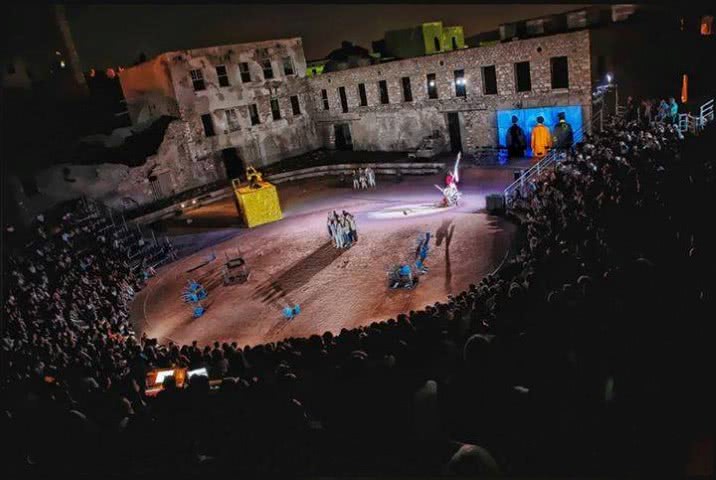Aeschylus THE PERSIANS -first draft
-a ‘liturgy’ on the Persians’ destiny

PREMIERE AUGUST 28, AT AESCHYLEIA FESTIVAL, ELEFSINA
Summer 2015
Translator Nikoletta Frintzila
Director Martha Frintzila
Set designer / music composer Vassilis Mantzoukis
Lighting designer Felice Ross
Costume / props designers Olga Sfetsa, Ilianna Skoulaki
Assistant director Michalis Panadis
Videographer Aris Zagklis
Photographer Orfeas Emirzas
Set constructor Giannis Brouzos
Director's assistants Stella Papakonstantinou, Vicky Polychroni
Production manager Ioanna Nasiopoulou
ATOSSA Tania Papadopoulou
MESSENGER Kostas Vasardanis
DARIUS Argyris Bakirtzis
XERXES Giorgos Vourdamis Mavrogenis
MILITARY ADVISOR Agapitos Mandalios
FINANCE ADVISOR Dimitris Bikiropoulos
RELIGIOUS ADVISOR Andonis Vlisidis
ADVISORS
Giannis Gioulis
Giannis Syllignakis
OLD MEN
Serafeim Iatropoulos
Giorgos Karvis
Kostas Laskos
Andreas Papadopoulos
Giannis Trivellas
Fotis Armenis
FOLLOWERS Andreas Xiaris, Apostolos Kotsis
NURSES Nefeli Ananiadi, Vassia Balla, Maria Dialoupi, Smaragda Kakkinou, Elina Kioupaki, Jo Nasiopoulou,
Stella Papakonstantinou, Dimitra Paraskelidou, Clairie Papadopoulou, Chryssa Parianou, Vicky Polychroni, Daphne Tsiridou, Rubini Fefe, Olga Fragouli.
QUEEN'S MAIDS Fenia Tsami, Federica Santarelli
CHILD – PSYCHOPOMP Styliani Trivella
YOUNG SOLDIERS ON VIDEO
Michalis Panadis
Markos Papadokostantakis
Christos Paliogiannis
SOUL GUARDIANS
Ioannis Kotidis (Ioko)
Vicky Polychroni
Clairie Papadopoulou
Humanity’s oldest theatrical text staged as a ‘liturgy’ by the theatrical troop Dromos me Dentra
The all human wailing disguised as tragedy
Written at a time which denounced timeliness in tragedy, the Persians, Aeschylus’ highest intellectual work, the only ancient Greek tragedy whose plot is contemporary to the writer’s era, was staged in order to teach the 5th century Athenians that the tragedy of human destiny breaks into pieces the meretricious barriers of time and space and recognizes neither winners nor losers.
Aeschylus’ tragedy about a war in which he fought in and bled, about a war in which he lost his brother is the wailing of the victors disguised as the funeral song of the defeated.
The lament of the victors when they realize that the other side of their victory is defeat, its mirroring is perdition, its reflection is calamity. The point when they realize that the Persians’ certainty is sank in Strymon river’s freezing waters, is the point in time when they realize that their own certainty and grandiose ideas are also drifted to the bottom.
The lament of life’s ever ‘winners’ when they experience terror, pity and sympathy. When they feel that their laughter drowns in tears a small piece of land far away.
The lament of the triumphers at the point when the aching hands that rattle a remote and ravaged land echo in their ears the gallop of destiny swiping away he who boasts and overturning he who overflows with arrogance.
In Aeschylus’ tragedy, the lamentation for all these artworks which break into pieces in the name of intolerance is converted to a thunderous indictment of the dead to the distraught living. The eternal lament of Women who sacrifice their companions, parents and children, in the gallows of war, wears the mask of grief of a foreign queen whose father, husband and son were tore apart by the war. But mostly, the lamenting of the living is disguised as an obituary which floods the earth, overturns the world’s order and raises the dead.
The Persians by Aeschylus constitute theatre’s memorial ceremony in order not to forget anonymously the defeated, a memorial ceremony which History, written by the ‘winners’, would have never held.



